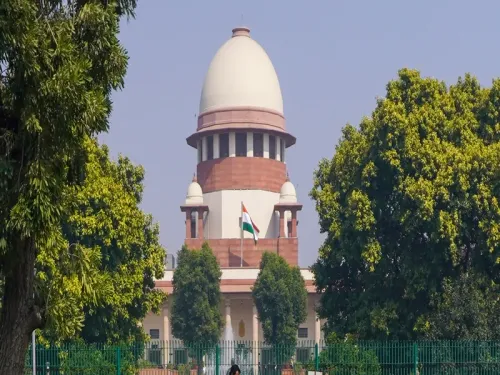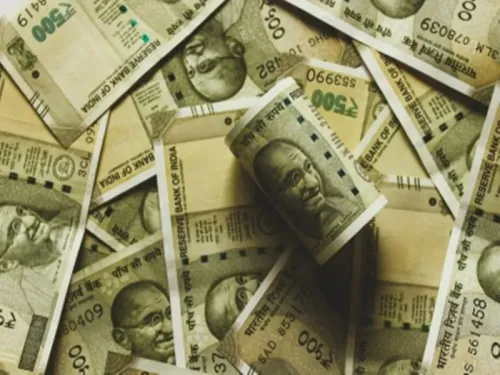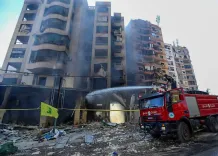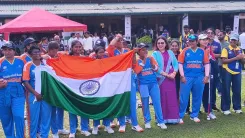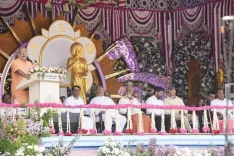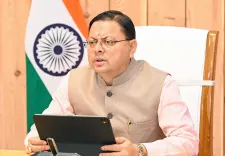Is There a Future for Democracy in Bangladesh Without Opposition?
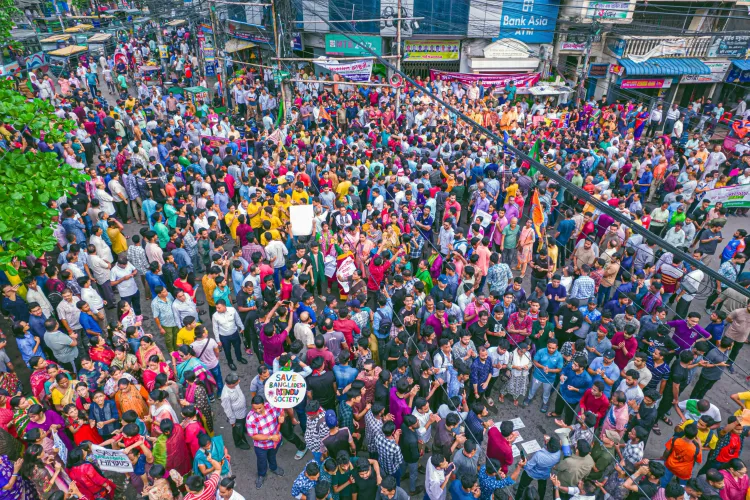
Synopsis
Key Takeaways
- The July Uprising highlighted youth activism against authoritarian governance.
- The interim government has taken controversial actions to suppress opposition.
- Historical revisionism is evident through changes in educational materials.
- Public opinion shows lingering support for the Awami League.
- The upcoming elections may lack genuine opposition.
New Delhi, Oct 8 (NationPress) The July Uprising of 2024, characterized by youth rising against perceived injustices and the authoritarian rule of Sheikh Hasina, quickly lost its allure after the formation of the interim government on August 8, 2024, led by Muhammad Yunus as chief advisor.
It has become evident that this uprising was orchestrated by forces opposed to Hasina, aiming to destabilize her regime. The deteriorating law and order situation since August 5 last year, coupled with a troubling surge in mob violence, sexual assault, and other heinous acts, appears to follow a clear agenda—elimination of dissenters or opponents of the interim government.
A year into this 'new' democracy in Bangladesh, little has changed. Those who previously labeled the former government as 'fascist' are now mirroring the very behaviors they claimed to oppose. With the power dynamics reversed, the 'restored' democracy has no room for opposition.
Who are the adversaries in this new Bangladesh? The foremost figure is Sheikh Mujibur Rahman, the architect of the Liberation War, affectionately known as Bangabandhu or Jatir Pita.
The alarming instances of attacks on murals depicting Sheikh Mujibur Rahman across the nation are not mere acts of mob violence; rather, they signal an assault on the principles that underpin the Liberation War.
Instead of denouncing such acts, the interim government has taken steps to rewrite the narrative surrounding Sheikh Mujibur Rahman—canceling national holidays in his honor, removing his likeness from new currency, renaming institutions dedicated to him, and even revoking his title as 'Father of the Nation.'
Additionally, the Supreme Court of Bangladesh has repealed the national slogan 'Joy Bangla.' Now, public expressions of this liberation slogan or any mention of Sheikh Mujibur Rahman can lead to police arrests and harassment.
Through educational reforms, the interim government has initiated a process of historical revisionism, downplaying the contributions of the Awami League and Sheikh Mujibur Rahman during the Liberation War.
One might question why the narrative of the 1971 Liberation War and Sheikh Mujibur Rahman's legacy is resurfacing in current political discussions, particularly among those opposed to Hasina.
These actions represent calculated efforts to marginalize the Awami League, the preeminent political party in Bangladesh that played a crucial role in leading the fight for independence during the 1971 War.
The student faction of the Awami League—Bangladesh Chhatra League—was labeled a terrorist organization last October, leading to a complete ban on the Awami League in May through amendments to the anti-terrorism law (2009).
Amid escalating mob violence, the interim government witnessed the demolition of 32 Dhanmondi, Sheikh Mujibur Rahman’s private residence, during a protest dubbed the 'Bulldozer Procession' in February.
This reprehensible act was defended by the interim government as a response to provocations by Sheikh Hasina, who was accused of attempting to destabilize the nation from abroad, a common excuse to evade accountability for the government's inability to maintain law and order. Further vandalism ensued, targeting Mujib’s properties and murals across over 20 districts, along with the homes of Awami leaders.
When a similar 'Bulldozer Program' was attempted by a group aiming to destroy the ancestral home of former liberation war minister Mozammel Haque in Gazipur, clashes erupted as these attempts were thwarted. Rather than arresting the true instigators, the interim government responded with a counterinsurgency operation known as Operation Devil Hunt on February 8.
By February 20, this operation had led to the apprehension of 18,384 individuals across Bangladesh, the majority of whom were associated with the Awami League and its affiliated organizations, Chhatra League and Jubo League. This law enforcement initiative served as yet another means for the interim government to suppress the Awami League.
Not only the Awami League but also its political partners have faced aggression, albeit indirectly from the interim government. Since last year, the headquarters of the Jatiya Party (JaPa) have been vandalized and incinerated, escalating political discord.
JaPa leader Golam Mohammad Quader was among the first to criticize the chief advisor and the interim government publicly for its handling of law and order, labeling the NCP as the 'King’s party' and questioning the legitimacy and capacity of the interim government to conduct free and fair elections.
In August, further attacks on JaPa occurred, instigated by factions of Gono Odhikar Parishad and Islami Andolan, which became increasingly violent.
All Islamic parties, alongside the NCP and Gono Odhikar Parishad, have been pressing the interim government to impose a ban on JaPa similar to that on the Awami League.
Inspired by a procession led by the NCP in May that culminated in the Awami League's ban, Islamic factions have recently taken to the streets with various demands, including a ban on JaPa and former Awami League allies. The interim government has yet to take an official stance on this but may consider a similar action in the future if pressure mounts.
In August, the interim government also introduced the July Declaration, a political statement acknowledging both the past and the 'unfulfilled aspirations' that arose during the July Uprising.
However, the declaration, comprising a 28-point framework, serves more as a manifesto denouncing the Awami League’s actions since Bangladesh’s independence and criticizing the weaknesses of the 1972 Constitution, which failed to fulfill the aspirations of the Bangladeshi populace. The declaration, while being a one-sided critique of the Awami League, also mentions the interim government and Yunus’ leadership in an effort to legitimize its existence despite its unconstitutional nature.
With the Awami League and its former allies sidelined, and national elections anticipated in February next year, the electoral contest appears to be among political parties—old and new—that maintain amicable relations with the interim government, particularly with the chief advisor.
However, public sentiment, as reflected in a recent opinion poll, presents a compelling narrative—continued support for the Awami League, even in light of its ban. The recent People’s Election Pulse Survey (PEPS) revealed that 41.3% of respondents favor the BNP, 30.3% support Jamaat, and 18.8% favor the Awami League. Moreover, when asked if the Awami League should be permitted to participate in the elections, 45.79% favored an inclusive election with the League contesting, while 45.58% wanted to exclude the Awami League from the ballot. The League continues to be popular among older generations who experienced the Liberation War.
This situation raises the question of whether the Awami League should be barred from the electoral process or be allowed to face the electorate's will, whatever the outcome. Given the current climate, it seems the interim government would prefer to exclude the Awami League from competition to maintain the narrative of its unpopularity as a 'fascist' entity painted by Yunus and his associates.
Thus, with the assistance of law enforcement, the interim government is engaging in a renewed campaign against Awami League supporters and activists, even after a year since the July Uprising.
The recent detention of 244 leaders for organizing flash protests nationwide unveils a harsh reality—that the Awami League still holds the trust of its loyal base. As Bangladesh braces for a democratic transition in less than five months, it appears this democracy may exist without an opposition.

